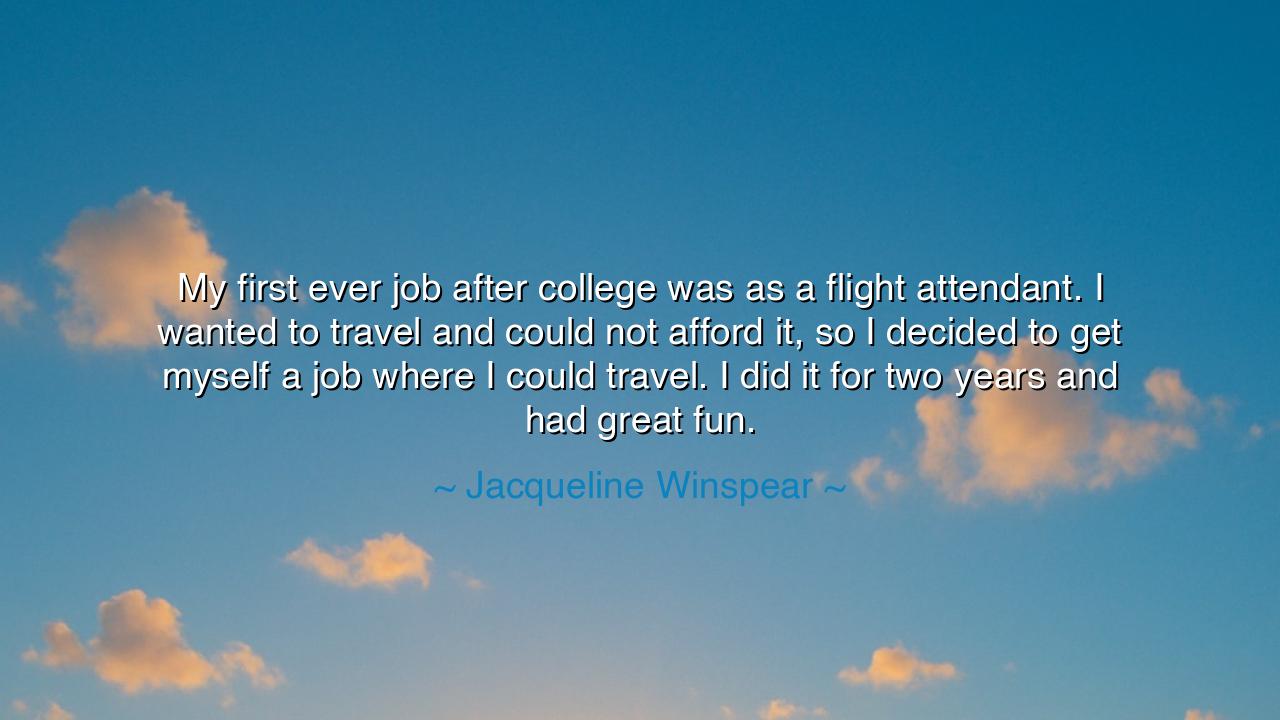
My first ever job after college was as a flight attendant. I
My first ever job after college was as a flight attendant. I wanted to travel and could not afford it, so I decided to get myself a job where I could travel. I did it for two years and had great fun.






"My first ever job after college was as a flight attendant. I wanted to travel and could not afford it, so I decided to get myself a job where I could travel. I did it for two years and had great fun." Thus spoke Jacqueline Winspear, and within her words lies a lesson as old as the journey of humankind: where there is desire, there is also invention; where there is limitation, there is also a path for the bold-hearted. She longed for travel, but the chains of poverty stood in her way. Did she surrender to those chains? No. She turned necessity into opportunity, seeking not excuses but solutions. She placed herself upon the wings of the skies, and through courage and cleverness, she tasted the joy she sought.
The ancients would have praised such ingenuity. For is this not the same spirit by which Odysseus, cunning and resourceful, navigated his way through countless obstacles? When the road is blocked, the wise do not turn back—they find another way. Winspear could not purchase her passage through the world, so she bartered her labor for it. By doing so, she proved that dreams need not be denied by circumstance, but may be pursued through creativity, sacrifice, and determination.
Her story also reveals a greater truth: that joy is not found only in achievement but in the journey itself. She worked as a flight attendant, a role often seen as menial or taxing. Yet through that role she unlocked the gates of the world, soaring above oceans and mountains, meeting strangers, glimpsing cultures, and carrying stories that would later shape her life as a writer. What others may have dismissed as ordinary labor became, for her, the golden key to freedom and delight. This is wisdom: to see beyond the appearance of a task and recognize the hidden doors it opens.
History offers us similar examples. Consider Marco Polo, who though born to a family of merchants, did not simply accept his fate at home but used his family’s trade as a means to journey eastward, bringing back wonders that reshaped Europe’s understanding of the world. Or think of Sacagawea, who, though taken from her people, transformed her role as a guide and interpreter into a bridge between worlds, helping Lewis and Clark navigate an unknown continent. Like Winspear, they turned the positions they found themselves in into opportunities for exploration and growth.
Children of tomorrow, learn from this: the way to your dreams may not be straight. It may not come wrapped in riches or ease. But if you are willing to adapt, to use what is at hand, even the most ordinary work can become the path to extraordinary horizons. Travel, whether through the world or through the mind, belongs not only to the wealthy but to the bold. If you cannot walk through the front gate of opportunity, then build a side door with your hands.
Practical wisdom lies here. If you long for something—whether it is knowledge, adventure, or creation—ask not first what you lack, but what you have. Can your talents, your work, your effort open the path? Seek out roles that serve your passion, even if they appear humble. Accept them not as burdens but as stepping stones. And when you walk upon them, do so with joy, for the journey itself is part of the treasure.
Thus the lesson is clear: dreams are not bound by wealth but by will. Jacqueline Winspear’s story reminds us that passion can turn work into wings, that even a job born of necessity can become a vessel of joy. Let us then live with the same spirit: creative, resilient, and open to the hidden opportunities life presents. For those who do so will find, as she did, that the world is vast, the skies are open, and the journey is filled with great fun.






AAdministratorAdministrator
Welcome, honored guests. Please leave a comment, we will respond soon